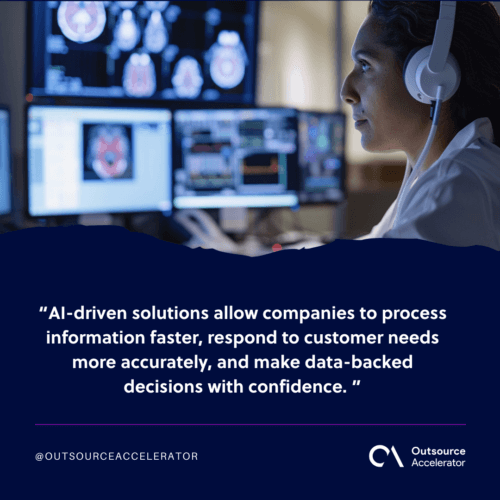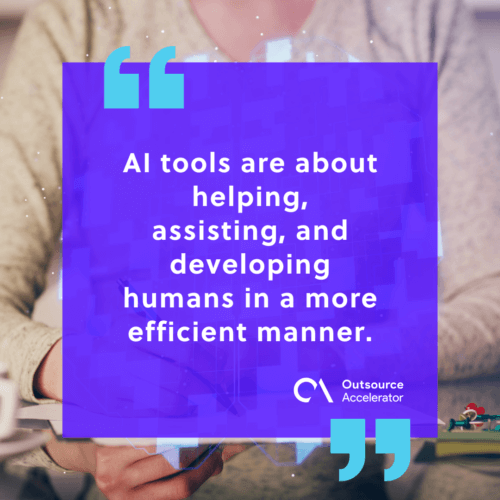5 Practical AI applications for businesses

In recent years, artificial intelligence (AI) has transformed from a futuristic concept to a practical, valuable tool for businesses.
The integration of AI technology into business operations offers companies a range of solutions. This new tool is able to enhance productivity, improve customer experiences, and optimize processes.
For outsourcing and service-focused businesses in particular, AI opens up powerful ways to deliver better service while reducing costs and maximizing efficiency.
In the 514th episode of the Outsource Accelerator Podcast, Daniel Duggan, the Operations Manager of Acquire AI, touches upon the realistic tasks that AI can do now.
This article explores the growing role of AI and highlights five practical applications that are helping businesses stay competitive.
AI’s growing role in business
Despite the recent explosion, AI has already been around in some forms.
Daniel notes that, “technology around supporting the outsourced systems processes, and people has been around for many years now. Certainly with the advent of the first-generation chatbots, commercially now moving on to the more advanced platforms.”
AI’s role in business has expanded as advancements make AI tools more accessible, adaptable, and cost-effective. Today, businesses leverage AI for tasks that require data analysis, customer interaction, and automated decision-making.
AI-driven solutions allow companies to process information faster, respond to customer needs more accurately, and make data-backed decisions with confidence.
For outsourcing companies and service providers, these AI applications have a transformative impact. It enables them to optimize operations and provide higher-quality services to clients across industries.

5 AI applications in business
AI’s adaptability has led to various applications that suit different business needs.
Daniel ultimately sees the technology as a partner, not a replacement.
“Like the outsourcing industry is a partner in operations, AI is a partner in operations as well.”
Here are five AI applications that are helping companies optimize their operations:
1. Agent assist and co-pilot tools
AI-powered agent assist and co-pilot tools are revolutionizing customer service by providing real-time support to customer service representatives (CSRs).
These AI applications work by analyzing ongoing customer interactions and suggesting responses or information that can help CSRs handle inquiries more effectively.
Co-pilot tools can also automate tasks such as looking up customer history or troubleshooting steps. Agents can instead focus on personalizing the customer experience.
These tools reduce response times and improve the accuracy of responses, ultimately leading to higher customer satisfaction. In a call center or outsourcing environment, agent assist tools ensure that agents handle inquiries efficiently and correctly.
“We’ve seen success in agent assist and agent co-pilot,” Daniel says. “[It’s] around all the efficiencies that that brings, from new starters to even your oldest agents having access to information more quickly.”
2. Knowledge search capabilities
AI-driven knowledge search tools are invaluable for businesses that rely on quick access to information. Customer service departments, IT support, and research teams can see wide use of these.
These tools leverage AI algorithms to provide rapid search capabilities across vast information repositories, including FAQs, internal databases, and help articles.
For businesses, especially in customer service, knowledge search capabilities translate into faster responses, as employees can find relevant information in seconds.
In outsourced environments, AI-enhanced search tools ensure that agents can retrieve up-to-date information. This AI application enables them to answer customer questions confidently.
Daniel also heavily touts this feature.
“[It’s] having information available through natural language searching… again, it’s all about the efficiency and getting to the right information.”
3. Automated QA and coaching
Quality assurance is essential for maintaining high standards in customer interactions and support processes. AI applications can automate the assessment of customer interactions, evaluating them for factors such as tone, compliance with company protocols, and accuracy.
Automated QA tools analyze recorded or live calls, chats, and emails to provide real-time feedback or post-interaction analysis.
AI-driven coaching tools also play a role by helping employees improve their skills based on insights from QA assessments. In outsourcing contexts, automated QA and coaching streamline training, making it easier to maintain consistent quality standards across a distributed team.
Daniel comments that “it’s about helping, assisting, and developing humans in a more efficient manner.”

4. Predictive analytics for customer insights
AI-powered predictive analytics enables companies to make proactive decisions based on data-driven insights. By analyzing historical data, AI tools can identify patterns and predict future behaviors, trends, and preferences.
This AI application is especially beneficial in customer-facing roles within outsourcing environments. It allows teams to offer personalized and timely solutions to clients.
This foresight from predictive analytics gives companies a competitive edge and allows them to be more responsive to market changes.
5. Workflow automation and process optimization
One of the most valuable applications of AI in business is workflow automation, which helps eliminate repetitive tasks and streamline operations.
Daniel even considers this function as “low-hanging fruit.”
“A lot of things being copied and pasted and translated and saved and copied again, then pushed into a report and emailed. There’s lots of opportunities there.”
AI-powered automation tools can perform tasks like data entry, invoice processing, report generation, and appointment scheduling with minimal human intervention.
The International Data Corporation (IDC) predicts that 80% of global data will be unstructured by 2025. This necessitates a more modern approach to sorting.
For example, an AI-driven system can automatically sort and categorize incoming emails or flag urgent requests for immediate action.
Workflow automation is particularly useful in outsourcing, where companies handle large volumes of data and standardized tasks for multiple clients.
Automating these processes helps reduce human error, improve productivity, and free up employees to focus on more strategic activities. By optimizing workflows, businesses can deliver faster, more reliable service while keeping costs under control.
Adopting AI applications to remain competitive
A structured approach to AI in business showcases how technology is reshaping service delivery and operational efficiency.
By implementing the right AI tools, companies can achieve higher productivity, streamline processes, and deliver a superior experience. This all helps strengthen their position in a competitive market.
For Acquire’s part, Daniel is prepared to help guide willing clients through the transition.
“We’re doing all that work so we can assist and partner with organizations to help them navigate this ever-changing world of AI.”







 Independent
Independent




